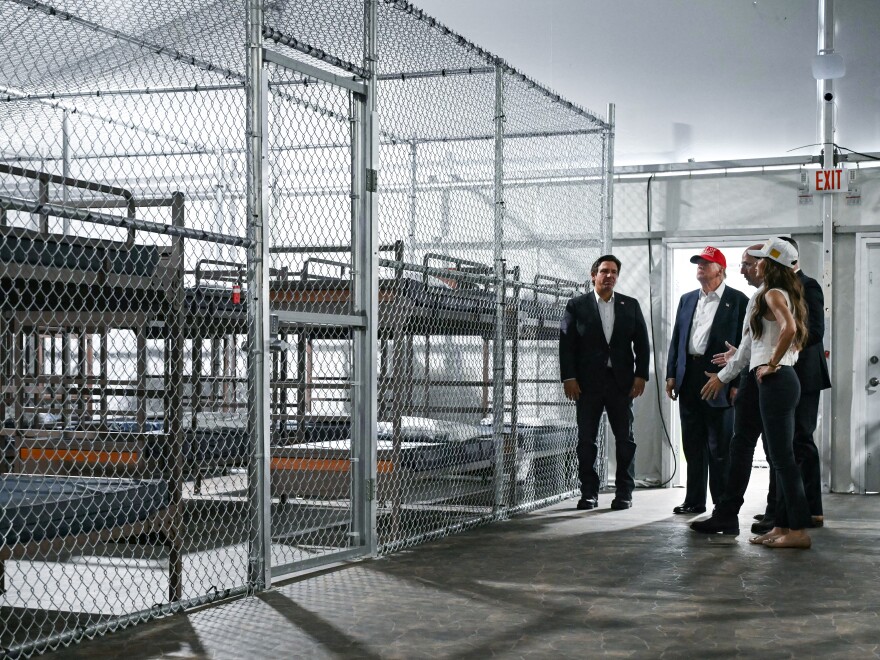Miami Construction at an immigration center in Florida’s Everglades has been temporarily halted by an order issued by a federal judge.
The judge ruled that while she considers a challenge to the facility from environmental organizations, construction on the site, including lighting, tarmac, fencing, fill, and other structures, must cease. As the legal process progresses, however, immigration detentions and other operations at the prison will continue.
Friends of the Everglades, the Center for Biological Diversity, Earthjustice, and the Miccosukee Tribe have filed a lawsuit alleging that state authorities broke federal law by building the facility, known as “Alligator Alcatraz,” in a hurry without consulting the public or creating an environmental impact statement.
Housed near a largely deserted airstrip amid the marshes of the Big Cypress National Preserve, the facility houses up to 5,000 immigration detainees in caged cells and tents.
Florida and Trump administration attorneys argued that federal law does not apply since the facility was constructed and is run by the state. Judge Kathleen Williams, a U.S. District Judge, was not swayed by that argument.
She became irate after two days of hearings when she found out that construction was still going on at the location and that Florida’s attorneys had denied a request to halt it. A temporary restraining order imposed by Judge Williams halts building there for the next fourteen days. Her order has no bearing on immigration detentions or other procedures.
Environmental organizations said in court that further facility construction will degrade Everglades water quality and jeopardize the endangered Florida panther.
Florida panthers would lose at least 2,000 acres of their habitat because to the bright lights, increased traffic, and human presence at the site, according to Randy Kautz, a wildlife scientist who assisted in creating the state’s Panther Recovery plan.
Only 120 to 230 endangered panthers are thought to be left in Florida. State attorneys claimed the habitat loss was a minor portion of Florida’s panther range, which spans more than 3.1 million acres. However, Kautz claimed it would worsen the situation for the panther population.
Concerns over 20 acres of new asphalt paving on the property and its potential effects on water quality in the delicate ecosystem were brought up by Wetlands Ecologist Christopher McVoy, who contributed to the creation of the Everglades restoration plan. He claimed that the nutrients in the Everglades are quite low. According to him, runoff that contains pollutants and fertilizers would have a “drastic impact” on wetlands in the area.
The groups allege that Florida and the Trump administration violated the National Environmental Policy Act (NEPA) by expediting the construction without conducting an Environmental Impact Study, holding hearings, or soliciting public comment.
The judge was informed by Justice Department lawyer Marissa Piropato that “NEPA does not apply here because the federal detention facility is controlled by Florida.” Florida is anticipated to request compensation from the Trump administration for the estimated $450 million it is spending on the site’s construction and operations.
Throughout the hearings, Judge Williams referenced remarks made by Trump administration officials who frequently questioned, “Who’s running the show?” and referred to it as an Immigration and Customs Enforcement (ICE) facility. She speculated that federal officials may have purposefully tried to evade complying with NEPA by redistributing responsibility for the detention center’s construction and operation.
“We’re happy that the judge recognized the urgent need to halt further construction, and we look forward to advancing our ultimate goal of protecting the unique and imperiled Everglades ecosystem from further damage caused by this mass detention facility,” Eve Samples of Friends of the Everglades said in response to the judge’s ruling.
According to James Uthmeier, the attorney general of Florida, “Judge Williams’ order is wrong, and we will fight it.”
Generally speaking, temporary restraining orders cannot be challenged. While the judge considers the environmental groups’ request for a preliminary injunction to stop operations at the site, it will stay in place. Tuesday is the next hearing date.
Copyright 2025 NPR






